- Research
- Research Centers
- Journals
- Admission
- Introduction
- Programs
- Application
- Alumni & Giving
- Alumni Club
- Giving
The 10th Asia-Pacific Translation and Interpreting Forum (APTIF 10) concluded at Beijing Foreign Studies University (BFSU) on June 26.
The two-day event was jointly hosted by the International Federation of Translators (FIT) and the Translators Association of China (TAC) and undertaken by BFSU.
It drew the attendance of Gao Anming, chair of APTIF joint committee, executive vice-president and secretary-general of the TAC, vice-president and editor-in-chief of China International Communications Group (CICG) and council member of the FIT, and Sun Youzhong, member of the standing committee of CPC BFSU committee and vice-president of the university.
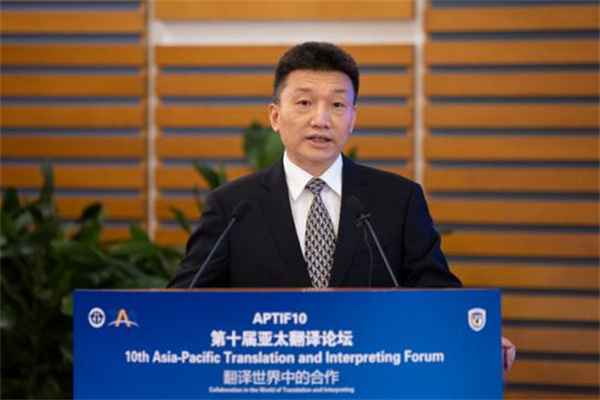
Yu Tao, vice-president of CICG and director of National Committee for Master of Translation and Interpreting Education, addresses the closing ceremony of the APTIF 10 on June 26. [Photo/bfsu.edu.cn]
Yu Tao, vice-president of CICG and director of National Committee for Master of Translation and Interpreting Education, said participants put forward valuable views and suggestions in the two-day event. The forum reached important consensus on exploring new models in translation and interpreting cooperation and promoting the innovative development of the industry.
Noting that the world economic center continues to shift towards the Asia-Pacific region at an accelerated pace, Yu suggested that the translation and interpreting professionals in the region should enhance solidarity, strengthen collaboration, increase dialogue, exchanges and cooperation, and work together to promote the cultural and industrial development of the industry.
He stressed that the APTIF 10 has drawn a blueprint and injected new vitality into the growth of translation and interpreting in the Asia-Pacific region, hoping to promote the development of the entire region and improve the wellbeing of people through translation cooperation and mutual learning among different civilizations.
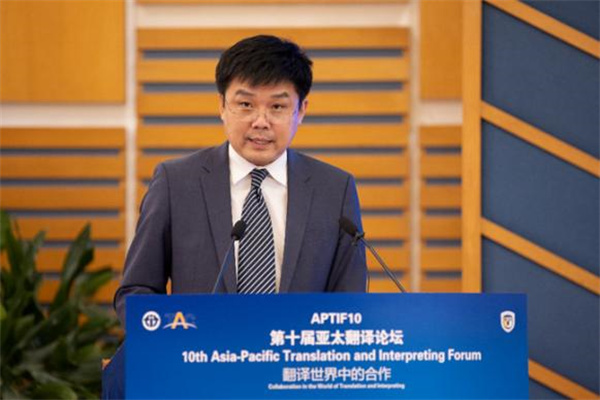
Zhao Gang, member of the standing committee of the CPC BFSU committee and vice-president of the university, speaks at the closing ceremony of the APTIF 10 on June 26. [Photo/bfsu.edu.cn]
Zhao Gang, member of the standing committee of the CPC BFSU committee and vice-president of the university, said experts, scholars, teachers and graduate students shared academic views in multiple forms, held talks over the historical functions of translation and interpreting, and made analyses of opportunities, challenges and trends in the industry.
Zhao emphasized that China’s translation and interpreting industry is set to fulfill major responsibilities and missions as the country is moving closer to the center of the world stage. He added that it is a fundamental and strategic task for the discipline to enhance the country's voice in international discourse.
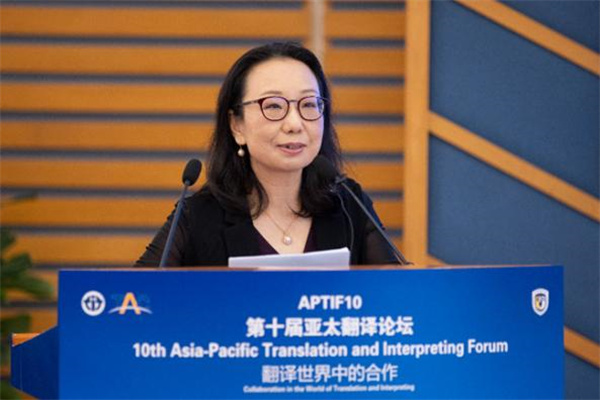
Yang Ping, executive council member of the TAC and Party secretary of the CPC ACCWS committee, reads out the APTIF 10 Initiative at the closing ceremony on June 26. [Photo/bfsu.edu.cn]
At the closing ceremony of the APTIF 10, Yang Ping, executive council member of the TAC and Party secretary of the CPC committee of the Academy of Contemporary China and World Studies (ACCWS), read the 10th Asia-Pacific Translation and Interpreting Forum Initiative on behalf of the hosts.
The initiative specified that the Asia-Pacific region has become the most dynamic and promising powerhouse globally and its strategic status has witnessed a consistent rise in the global development paradigm. It called on all countries and areas in the region to eliminate estrangement, give full play toward facilitating people-to-people exchanges, and enhance solidarity and coordination for common advancement.
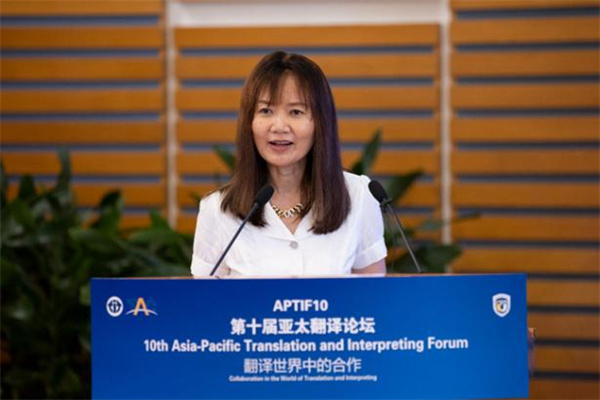
Ren Wen, dean of the Graduate School of Translation and Interpretation at BFSU, presides over the closing ceremony of the APTIF 10 on June 26. [Photo/bfsu.edu.cn]
Ren Wen, dean of the Graduate School of Translation and Interpretation at BFSU, presided over the closing ceremony.
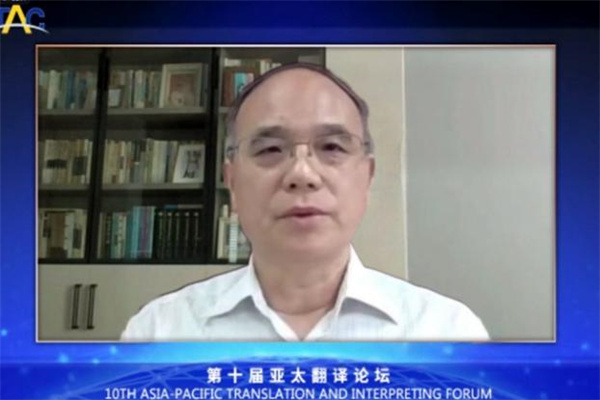
Xu Jun, former executive vice-president of the TAC and professor from Zhejiang University, delivers a keynote speech at the APTIF 10 on June 26. [Photo/bfsu.edu.cn]
In his keynote speech entitled "The Spirit of Cooperation in Translation and Reflection on Its Ethics", Xu Jun, former executive vice-president of the TAC and professor from Zhejiang University, said the spirit of cooperation is an inherent feature of translation and interpreting since it was born in cross-cultural communications. He urged translation professionals to safeguard cultural diversity and strengthen mutual learning among Chinese and foreign civilizations.
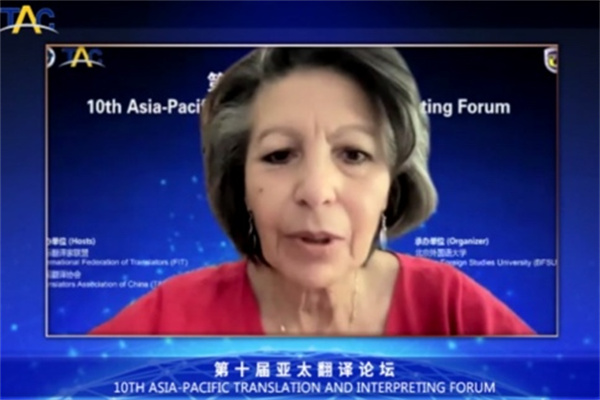
Mona Baker, professor from the University of Oslo, gives a keynote speech at the APTIF 10 on June 26. [Photo/bfsu.edu.cn]
Mona Baker, professor from the University of Oslo, gave a keynote speech entitled "The Oslo Medical Corpus: An Interdisciplinary Agenda for Rethinking Key Concepts in Global Health". She reviewed the development of corpus-based translation studies, gave an introduction to the emergence and knowledge genealogy of the discipline, as well as the medical corpus at her university. Baker also explained the importance of translation and interpreting in healthcare and policy making and called on cross-disciplinary cooperation to promote understanding among different disciplines and society.
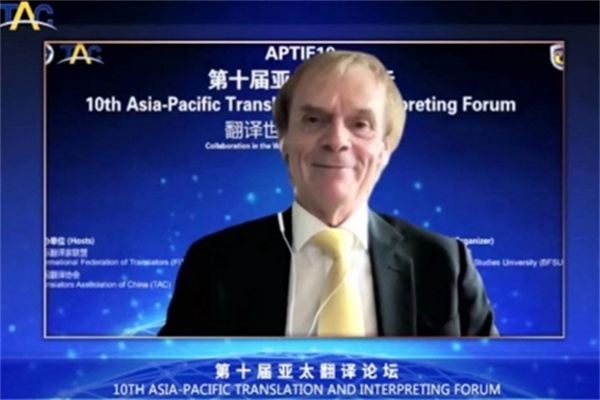
Gary Massey, director of the IUED Institute of Translation and Interpreting at Zurich University of Applied Sciences and vice-president of the CIUTI, presents a keynote address at the APTIF 10 on June 26. [Photo/bfsu.edu.cn]
In his keynote speech entitled “Soft Skills Are Getting Harder: Collaboration and Competence in Translator Education”, Gary Massey, director of the IUED Institute of Translation and Interpreting at Zurich University of Applied Sciences and vice-president of the Conférence Internationale Permanente d'Instituts Universitaires de Traducteurs et Interprètes (CIUTI), talked about the development issues related to cooperation capacity among main bodies in translation and interpreting teaching, offering inspirations for teachers, students and language service providers.
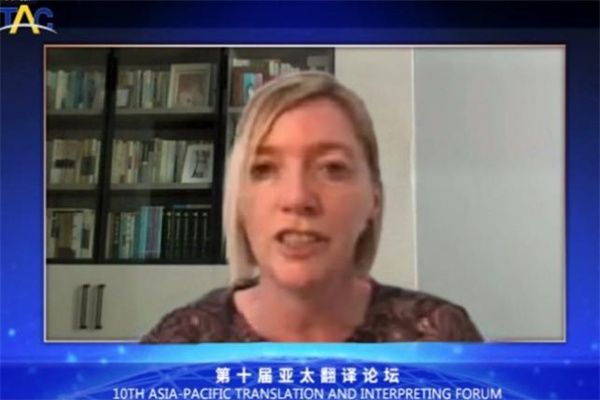
Sharon O'Brien, professor from Dublin City University, gives a keynote speech at the APTIF 10 on June 26. [Photo/bfsu.edu.cn]
Sharon O'Brien, professor from Dublin City University, underscored the positive functions of collaboration in crisis translation, and explained how to view and encourage such cooperation based on living examples in her keynote speech entitled "Collaborative Crisis Translation".
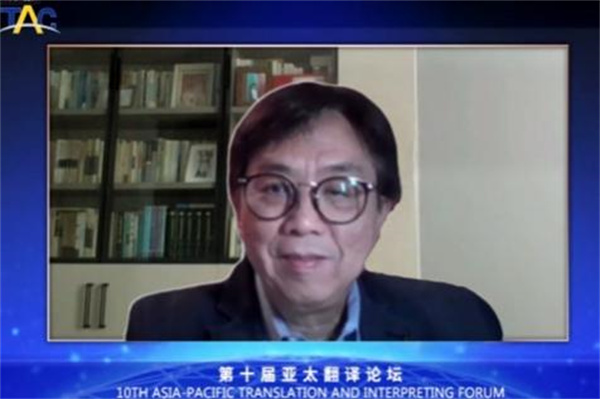
Lawrence Wang-chi Wong, director of the Department of Translation at CUHK, delivers a keynote speech at the APTIF 10 on June 26. [Photo/bfsu.edu.cn]
Lawrence Wang-chi Wong, director of the Department of Translation at the Chinese University of Hong Kong (CUHK), delivered a keynote speech entitled "Unsuccessful Collaboration: The Drafting and Translation of the Supplement Treaty (Treaty of the Bogue) between Great Britain and Qing China in 1843”. He highlighted professionalism embodied by translation and interpreting workers and the significance of information synchronization in translation cooperation.
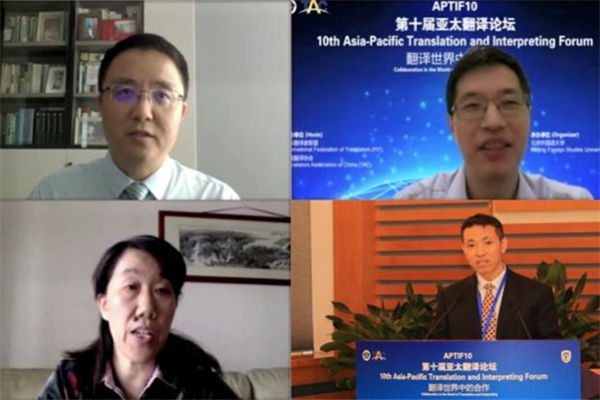
Chairs of the keynote speeches at the APTIF 10 on June 26. [Photo/bfsu.edu.cn]
The two-day forum, which consisted of 10 keynote speeches, 12 regular theme forums and four parallel discussions for aspirant graduate students, brought together nearly 300 onsite and online participants from 35 countries and regions.
The event was followed by 243,000 attendees online and received nearly 80,000 likes on China’s famous short-video platforms.